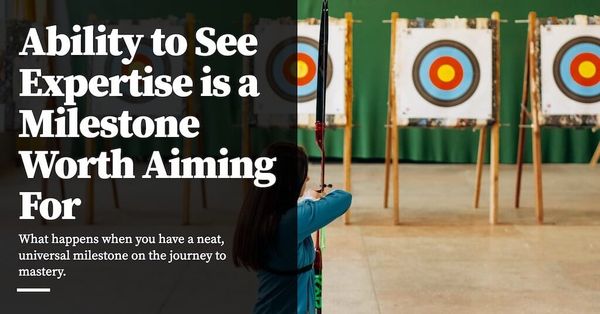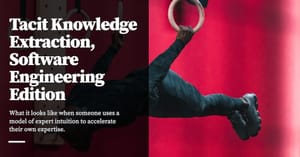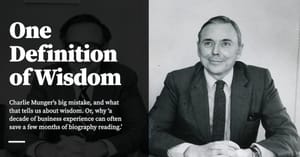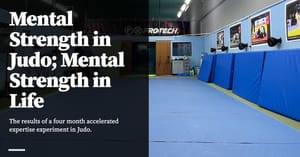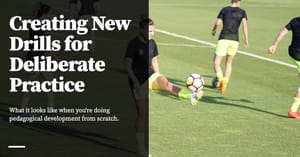One of the inconvenient facts of expertise is that experts can see more gradients of expertise than novices can. A friend once described it to me as: “there are more levels of expertise than there are types of incompetence”, and I think about that framing a lot.
Why is this inconvenient? The obvious way this is inconvenient is that — as a novice, you often can’t tell why an expert is good at what they do, or how one expert is better than another. This in turn means that you can’t easily break down how or why experts are able to do the things that they do, so that you may learn from them. This applies as much to business and management as it does to music and chess.
Here’s a trivial example: I don’t play tennis, so whenever I watch tennis I see two humans whacking a fluorescent ball across a court at each other. I can’t tell what makes playing a particular type of court easy or hard, or how different play styles fare when playing on different surfaces; when tennis players say “oh, so-and-so is more dominant on a clay court” I smile and nod but have no understanding of what it feels like to play on clay or how someone might have an advantage on it. I mostly watch tennis for the drama of competition, with no awareness of the subtlety of technique. Consequently, tennis players get more out of watching tennis than I ever will.
There is, however, a more interesting way the inconvenience expresses itself. If you’ve done any freelance work, you might have observed that certain freelancers in your domain might charge rates that are unmoored from their relative skill levels. As an example, a great designer might charge 2x less than a good designer; this occurs despite the expert being much more experienced, much more able to tackle more complex projects, having just as good stakeholder management skills, etc. This violates our expectations that the better you are at something, the more you should get paid for it. In practice this doesn’t occur because of the quirk of expertise we’ve just discussed: above a certain level of skill, novices (who make up the bulk of customers) can’t differentiate between practitioners at the higher end of a skill tree. But of course practitioners totally can; this is why you’ve observed this discrepancy while customers do not.
Marianne Bellotti takes this idea further and makes it useful:
People tend to assume that more experience (read: an increase in skills) will get them access to those networks with higher earning potential and therefore higher wages. But that’s not how high wage earners hunt for talent. In every profession there’s a point where further improvements in skills are so subtle that the difference between one level and another can only be appreciated by another expert. Customers tends not to be experts. So after a certain level of skill has been achieved, any improvements that are made through experience are invisible to the people you’re selling to.
We want quality to speak for itself, but it almost never does. Instead people tend to judge value by reference point. Rich clients attract more rich clients. A piece of art owned by a famous person is more valuable than it was before it was bought. A freelancer worker who’s done work for someone important is more attractive to a higher class of client.
That means people do not work their way up to higher wages when they’re independent agents. There’s no amount of work done at a middle price point that leads to an offer to charge more. You get to the higher wage group by changing the network you’re sourcing clients from (emphasis mine).
Bellotti’s observations are worth reading in their entirety, especially if you’re interested in the actionable implications of the idea. But I’d like to take this property of expertise in another direction. Now that we know that expertise is more legible to experts, could we perhaps invert this observation and turn it into a goal by itself? Could you turn this into something that helps you acquire expertise?
I happen to think that you can.
Exploiting Expertise Observation as a Goal
First let’s talk about the problem we want to solve.
In some skill domains, it is easy to measure the steady accumulation of expertise. In chess, for instance, there’s the FIDE score, which is an extremely legible way of measuring one’s skill level. You could start out in chess as a novice and go “ok I want to hit 2300 by the time I’m done with this” and make steady progress against that goal over the course of a few years.
Unfortunately, in most skill domains that we’re interested in, it’s a lot harder to find a good reference point to aim for. “I want to get better at writing” you might say, “or running a company” — but what does ‘better’ mean? What is ‘good enough’? At what rung on the skill tree do you want to stop at? (Are there even rungs on the skill tree for something like ‘running a company’?)
I think most of us just rely on ‘feel’. I ‘feel’ like I’m better than I was two years ago, and I’m happy with that feeling, and so on.
Before I give you an answer to this question of suitable skill goals, I want to talk about several adjacent ones. Some messier domains have fairly good, if vague, standards. For instance, Brazilian Jujitsu coach John Danaher has a relatively clear definition for ‘mastery’ in competitive martial arts: “if you can play a competitive match against someone ranked in the top 25 of your (combat) sport, and it’s a serious international sport (…) you don’t have to win, but you gave the other fighter a good workout … I would say you have shown mastery of your sport.” (He more controversially believes that the right player with the right training program can hit that level from complete beginner, within five years — though to his credit, he has actually done this for students in his capacity as a BJJ coach).
Another alternative is to pick an external marker of success. For instance, if you’re working on mergers and acquisitions, you could make your goal “to have done 100 M&A deals by the time I’m 45.” Or, for leadership: “to run a team of more than 150 people successfully — by, uh, some definition of success”; or writing: “to be published in The New Yorker”. In practice, many professionals do something like this: they pick some legible proxy for skill, say that they have reached some level of mastery when they hit that proxy, and shrug when you point out that such external proxies aren’t perfect measures of skill, or are subject to externalities — say, for instance, that you get published in The New Yorker because you met the editor-in-chief at a cocktail party and sent him a draft of an inspired essay on Shiba Inus in a time of Dogecoin mania, an essay that he published one issue later — does this count? Some might say yes, it counts, you’ve reached mastery in writing; others might frown and say no this was totally lucky and doesn’t count, go look for a better proxy for skill, and they’d both be right.
I’d like to suggest an additional bar.
I’ve noticed that in nearly every skill tree I’ve climbed, there comes a point where you begin to notice certain nuances of skill that novices not only don’t notice, but that you cannot articulate using the commonly accepted vocabulary of the skill.
I’m not the only person who has observed this. Here’s Graham Duncan, a capital allocator of some repute, on evaluating investment expertise (notes here):
Specifically, you’ll notice that in the language that people use. So I feel like in any field, I think, when you start to achieve mastery, often, people start creating their own language to capture the nuance that they’re seeing that makes them good at their thing (emphasis added). In investment management, Buffett is the Shakespeare of the industry. And everybody is living in his language and in his mental models to the point where it’s limiting. So I feel like a 25-year-old sometimes will be saying, “I’m sitting on cash just waiting for the fat pitch.” And I can’t tell whether he knows he’s quoting Buffett or not. And even if he’s doing it consciously, he’s living in this construct, which is a super useful construct. But if he proceeds to become the Tepper of his generation, he will generate his own language over the course of the subsequent 20 years.
And so when people use a lot of jargon and clichés and language that, at times, doesn’t feel like their own, to me, that’s a sign that maybe they’re a little bit earlier, and they could use another stage of apprenticeship. Or just that we would probably wait until a later stage.
Let’s call this point the ‘vocab point’ — that is, the point (per Duncan) ‘where you begin to make up your own language to describe the nuances of expertise you can see.’
I want to suggest that the vocab point is a good first milestone for any skill tree. If you can see what experts in that domain see, and you can have a decent conversation with them about it, I would say that you have reached a respectable level of expertise in that domain. You’re at least no longer a novice.
As a milestone, the vocab point has several things going for it:
- It is universal; every skill domain I know has nuances at the top that are difficult to articulate. It is also consistent with the common observation that experts are able to see things that novices aren’t able to see, and that whenever experts get together to talk shop, they tend to say things that are mutually comprehensible to each other but somewhat incomprehensible to an outsider.
- If you’ve experienced reaching the vocab point at least once in some skill domain, you know how it feels like and may hunt for it in other domains.
- Note that the vocab point isn’t mastery — it marks, I think, the beginning of advanced proficiency. I think this makes it a good stopping point, because you are now able to see the shape of the expertise that lies above you; you are better able to evaluate if you want to go further.
- And finally, most importantly, the vocab point is fairly legible to a practitioner. About which — more in a bit.
The vocab point is particularly interesting to me because I’ve started making it an explicit goal for some of the things I want to get good at.
I spent two weeks in Kuala Lumpur late last month, where I attended a handful of classes at the competition-oriented KL Judo Centre. After one of those sessions, an older black belter — a 64 year old judoka named Jason — asked me: “what do you want to get out of this?”
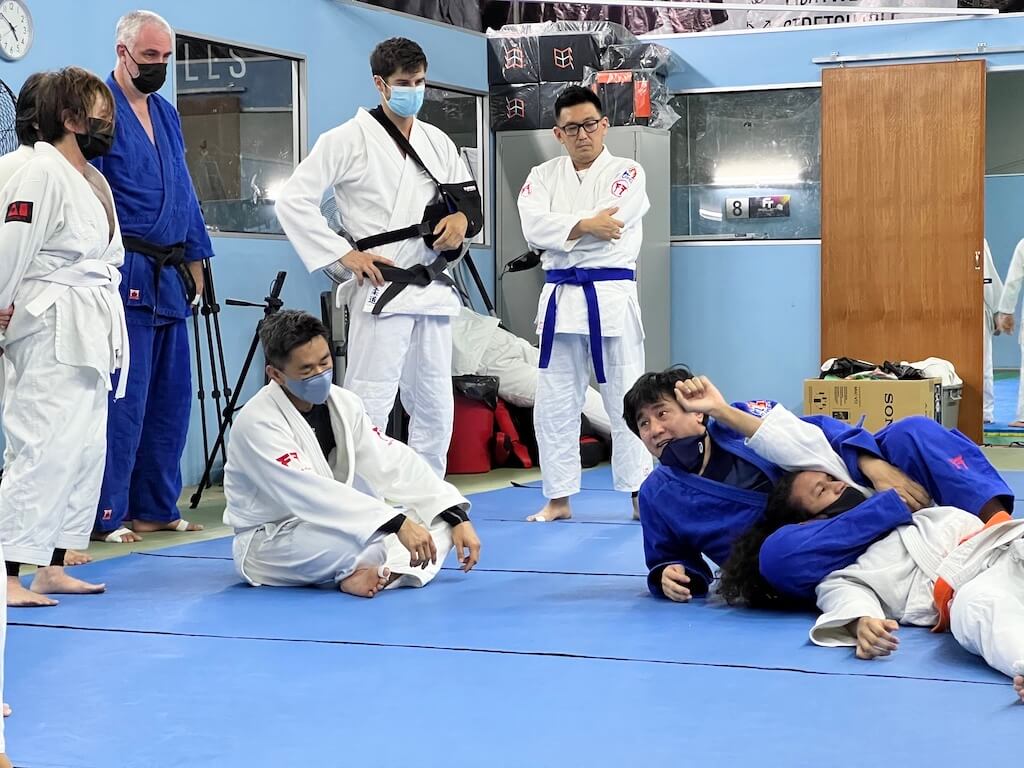
I went back to my AirBnB and thought about that question for a bit. Like Oon, the centre coach, and Jason, the senior belter, my serious competition days were behind me. But I quickly realised that I had a goal. I’d noticed that when Oon talked about competition Judo, or when he analysed international players fighting at the highest levels of the sport, he could see things that I could not, and he would call out specific grips or setups that I had no idea was happening. When I fought him in his dojo, Oon effortlessly shut down my grips, and then after taking a few of my attacks, he effortlessly shut down the setups for those throws as well. I did not understand what was going on while it happened. This wasn’t a complete surprise: Oon remains the only Malaysian to have gone to the World Championships and to have fought beyond the first round. In 1993, he placed 13th in the world for his weight category.
I’d written elsewhere about my history with the sport — I wasn’t very good, and I had gaping holes in my game. I wanted to shore up those holes before retiring from active Judo. More importantly, I wanted to be able to see the things that Oon saw when he watched an international Judo match.
To put this differently: Oon would say — and I would agree — that I am only slightly above a novice by international competition standards. I hadn’t yet reached the vocab point for my favourite sport, and I wanted to get there before I got too old to fight.
What a Vocab Point Looks Like
You might think that ‘seeing’ the vocab point and being good at the skill are two separate things, but this isn’t true. Sure, a novice tennis player who listens to sophisticated analysis might be able to ape good shop talk, and novice pundits will be able to put up a sophisticated show — but ask them to apply it to their own game and you’ll see them flail on the court.
To truly see what an expert sees, you’ll need some understanding of what is difficult — or what is important — about the technique in question. When watching tennis, for instance, experienced tennis players will react to certain shots in ways that I, as a non-player, will not; this comes from a deep understanding of what makes the technique difficult.
Here’s a fun example: in 2017, Roger Federer came out of a six-month break and beat his arch-rival Rafael Nadal in the Australian Open finals, at Indian Wells, in California, in Miami and so on, eventually winning his eighth Wimbledon, seemingly out of nowhere and at the ripe old age of 35. As a non-player I did not understand what was happening — I was mostly going “omg Federer is winning again?” to fellow tennis-watcher fans. It took a late 2017 New York Times article by former junior national player (and now writer) Peter De Jonge before I learnt what had happened. Apparently Federer had made a small tweak to his backhand. De Jonge spent much of his piece explaining the mechanisms of top level tennis, building up to this paragraph near the end of the essay:
Federer says that in the day and a half before the final, he and Ljubicic and his other longtime coach, Severin Luthi, talked so much about strategy and about Nadal’s tendencies that he was afraid his brain would be overloaded. “Sometimes you can overtalk the match, go into too much detail, and you make it like a chess match,” he says. “But I felt like everything we talked about pretty much happened.” Before he took the court, Federer made a fateful decision very much like the one he made all those years before in Ecublens: He was going to take the ball early, before Nadal’s topspin forehands jumped over his shoulder, and if that led to more errors, so be it. He wasn’t going to let Nadal get in a groove.
I understood this intellectually, but not viscerally. What does ‘taking the ball early’ mean, and why is it harder to play against? How exactly is using a bigger racquet more useful for this approach? I can repeat the words in the article but I have no idea what sorts of experiences they invoke. More importantly, I would not have known to look for the tweaks, although apparently plenty of other people noticed — the article mentions various top players and coaches who started talking about the backhand over the course of 2017.
If you want a non-sports example of the vocab point in action, take a look at Jacob Collier in Wired Magazine’s ‘person explains one concept in 5 levels of difficulty’ video series. Everything Collier says makes sense, up to the point where he gets to jazz legend and multi-Grammy-award-winner Herbie Hancock. At that point in the video, everything they discuss becomes incomprehensible to a musical novice.
That’s the vocab point in action.
What do you do with this? If I were a novice musician, I’d be taking notes on everything Hancock and Collier discuss. Perhaps not “I need to do what he does” but more “I need to get to a point where I can understand what they’re saying to each other.” In the same way, if I were a novice tennis player, I’d be reading De Jonge's essay and going “Why is a backhand hitting the ball before it passes one’s shoulder a big deal? I don’t know, which means I’m not that good yet. I better find out what that feels like.”
I realise that I’m somewhat constrained by the skill domains I can describe in this essay. I talk about sports and music because it’s easier to observe the vocab point in those domains. But I’ve seen hints that similar things exist in business and management and leadership, though it’ll take too much effort to set up for them in this piece.
Problems with the Vocab Point
I think one mistaken takeaway from this essay is that the vocab point is necessarily about articulation. Not every expert practitioner is good at articulating what they are able to notice. But the important thing is that they do notice, and that it’s part of the model of expertise in their heads. If they talk shop with another expert, one who is better able to articulate it than they are, the less articulate practitioner should immediately know what the other expert is talking about, and should be able to contribute observations or suggestions on the thing they’ve both noticed.
When I say that I want to get to the vocab point for Judo, I mean that I want to get to the point where I can follow shop talk between expert Judokas, by mapping what they’re talking about to internal feelings or nuances I’ve learnt in my practice. I don’t mean that I want to be able to articulate those internal observations or nuances to others.
The goal isn’t articulation; the goal is being able to truly understand what they’re talking about.
This leads us to another potential failure mode of the vocab point: what if you’re noticing spurious nuance? This is where expertise becomes more of a sociological phenomenon. The way you verify if you’re noticing spurious nuance is that you try and reach out to people who are more believable than you, and you ask them if they’ve noticed what you’ve noticed. If they scrunch up their face and say things like “sure, that’s interesting, but what strikes me as important in this case is …” you know you’ve noticed the wrong thing.
I don’t mean to say that experts are infallible. Certainly you should ask multiple experts, to triangulate on whether you’re noticing the right things. It’s also true that you may be noticing valid things that other experts aren’t noticing (which should make you a hell of a practitioner if you eventually become good). But until you reliably notice the things that they do notice, I’d hold such observations loosely.
I think the only major problem that I worry about with the vocab point is the possibility that certain skill domains are simply too wide and too varied for there to be a core set of expertise markers. I don’t think this is true — at least, everything I’ve read about cognitive task analysis tells me that most skill domains contain several core mental models that are common amongst all of its experts. But CTA hasn’t covered every skill domain under the sun, so it’s something that hangs out at the back of my head.
One last note. I said, earlier in this essay, that the vocab point is highly legible to practitioners, and then I said that this was yet another reason the vocab point is a good goal to aim for. I should probably clarify what I meant when I said that.
I think any practitioner who has gotten to a vocab point in some skill domain should know that expertise consists of many tacit … feelings. Why would a jazz musician pick one riff instead of another? Why would a writer pick three anecdotes over two? In most forms of expertise, skill tends to express in terms of feel — “it felt right”, or “it made sense to me.” Sometimes these experts can explain it. Other times not.
It’s not too surprising, then, that there comes a point when you engage with a community of fellow practitioners, and people begin to talk about what ‘feels right to them’, or ‘what it feels like to do that counter-intuitive thing, and oh yeah this other thing feels the same way’. Taking part in these kinds of conversations is only possible once you reach a certain level of expertise. More importantly, you’ll know when you’ve reached that point; the tenor of the conversations you can have with fellow journeymen will have changed permanently.
I know I haven’t reached the vocab point in Judo because I haven’t had such conversations with better players. That, plus I’m still noticing new things.
In the end, I talk a lot about Judo like it’s a tactical game of grips and throws and chokes. And at some level it definitely is something like that. But there are certain feelings that I don’t try to describe, because it would be useless to try. To pick a more common, easier-to-describe experience, there’s nothing quite like the feeling of doom when your opponent dominates a particular grip exchange in the fight, and you see a huge throw coming but you can’t do anything about it. Judo feels deeply personal when you lose, because it is a combat sport. When you put these two feelings together, you’ll find that the recognition of loss occurs a split second before the throw comes.
Every Judo player I know above a certain skill level knows these feelings. They represent a form of internalised knowledge. And I know many players who know much more than that. I want to have conversations with them about those things, but I can’t yet do so, because I’ve not learnt those internalised feelings.
I hope I’ll be able to have those conversations soon.
Update, 21 July 2023: I temporarily relocated to Kuala Lumpur in late 2022 and spent four months training Judo five hours a day, every day, and have since reached the vocab point for the sport. You may read more about that experiment here and the results here.
Related: The Tacit Knowledge Series covers tacit expertise, sets up definitions, and examines various methods of doing tacit skill extraction. Summary of K. Anders Ericsson's Peak; The Problems With Deliberate Practice. A summary of Accelerated Expertise. You can accelerate expertise with note taking. Why some people can achieve mastery through trial and error, and others cannot. Every great business person has the same mental model of business. Members only: A Map of Expertise for the Career Minded. What we know about expertise in business. The expertise of evaluating expertise (and follow up). Tacit Skill in Wicked Domains, A Loose Feedback Loop, Hold The Lessons of History Loosely.
Originally published , last updated .
This article is part of the Expertise Acceleration topic cluster. Read more from this topic here→

